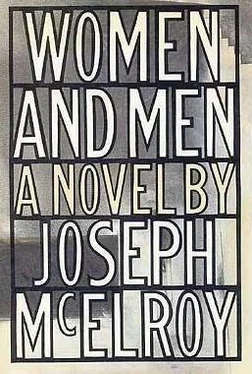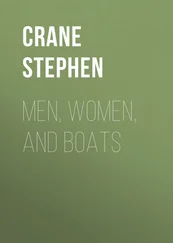"I said there was a lot to my father — why do you blame me for what might be in my head but I don’t say it? Why have I got to be held for what I’m smart enough not to belly-ache about? I mean" — he was staring into a kitchen wall when the calendar and phone materialized out of it and were there—"why don’t I get credit for not saying some things? What is it with you? how come you’re giving me the business when I’m only thinking my spite, not saying?" (She laughed.) "Is this some punishment I’m supposed to get regularly? And ‘spite’? where the hell did I get that word, I never say ‘spite’—it must have come from you."
Well every event has a cause no matter what they’re saying in the next twenty, thirty years, and behind him knowing he hadn’t picked his moment to be provoked Mayn had seen the tear she raised the knuckle of her scissor hand to catch as surely as he saw her tongue tip come, but — like an emergency support mechanism (he heard himself later supply).
"In future you better watch it, kid," he went on lamely in such sudden unhappiness he thought he didn’t give a damn about this stuff that came out of his mouth as if nothing had just happened, but he was uneasily glad Lucille Silver wasn’t attending this haircut because she would have attempted to wipe him out for speaking that way.
All right, Joy made him say things sometimes; but this was worse— "better watch it, kid," fond slight falseness, that might be then so bad good as to be laughable and she’d either grind off his ear at the head with her shears, or make a funny sound as if having made contact beyond him, subtler than the silly old college songs she sang to her daughter.
"It is the future," she said, "and as whoever it was in your family used to say, ‘don’t spare the horses’ "; and he felt nothing between them but a long range; just as well his chair didn’t face a barbershop mirror.
But the arch cheer in that dumb remark had calmed her eyes, he knew, and he heard her teeth coming down on her chewing gum.
She snipped some more. "Damn," she said, and stopped, and curried him with her fingers and went on.
And so he plucked then out of a void— the void, if the void may say so — a story — every time a story, until their secret tempos {tempi, his mother would have said to a musical partner, No she wouldn’t) located each other again as really the same (as if neither could want power over the other), until years later (still like some future becoming the present), under more experienced shears a story came to him from somewhere in the luggage checked in his head on the flight home last week, and he smiled and he told it to his wife — his wife of ten years, Joy. He’d run into this smart guy Spence. The story came from Spence. He knew Spence from way back, talked in his presence, met him without meeting him, a good listener the shit, Washington, New York, San Francisco, someplace else — and what Spence knew Mayn didn’t want to know; and this time Spence’s back was to Mayn, who, in the lobby, had seen him saunter across from the elevator and enter the bar but whom he now recognized anyway for his richly stitched long buffalo-skin jacket, the heavy slick of now-Hawaiian-dyed black hair, and the speckled hand moving out to the side independently to take nuts from the dish the bartender had set down between Spence and a woman in a suit and a big red hat. Mayn knew Spence’s face before it turned and the high husky voice easily included Mayn in what — after the too brief reference to a job he of course knew Mayn had been offered — Spence had resumed telling the bartender.
About a pounding (the pounding) in the Earth that Spence had heard and felt, so that the crowd voice that came with it seemed to come right up from the Earth he was standing on, right?
Yeah, said the bartender, who was very big, well that’s a funny location for it right next to the cemetery.
For Spence had been in a fine American cemetery hunting for the caretaker so he could check the lot chart and take a look at a grave — old mound that had never had a headstone — but he happened to find the family on the far edge of the cemetery and just when the pounding faded and Spence later recalled some bright colors moving through spaces in the trees, he heard this swishing and scraping. He had found a space that he thought was the unmarked grave and he was turning around to check exactly where he was when he heard a click nearby and a golf ball skipped off a gravestone apparently and rolled past and he watched it stop a few paces away; and he now realized he’d had a sense of being watched on this weekday among the sweet-smelling green and the personal gossip among the breeze-freshened gravestones and the doors and windows of the mausoleums, where he was exposed as if bright day was creepier than darkness honeycombed inside, but this sense did not go outside the cemetery on the side where the golf course was — but was right here.
And then the door of the little mausoleum next to him opened out a bit and a young man in white jeans appeared and watching Spence every foot of the way went and picked up the golf ball and returned to the mausoleum, closed the heavy door and stayed looking through the glass and ironwork until the glass absorbed him and he wasn’t there.
But Spence is grinning at you, is very open — as everyone’s beginning to say — the word, that is — and Spence includes you so you can be part of his ongoing business — and incidentally at this point grabs with one speckled hand for the peanuts, looks between Mayn and the guy in the red jacket behind the bar, and says, "I know what you’re thinking" — goes back to work, checks out the stones in the vicinity of the unmarked grave, and, without giving the guy in the mausoleum the benefit of a so-long-buddy glance, slopes off down an aisle, his hip-pocket notebook in hand. But runs into a big angry blonde who materializes in a red-and-white polka-dot sunsuit with an iron over her shoulder and she’s looking for the golf ball. So Spence gives her a smile and says he saw the ball but didn’t get a chance to pick it up and shows her where, and they separate just as Spence sees on the other side of the golf-course fence a sturdy Oriental gentleman all in this loose bag of a pale blue costume flanked by two golf carts (his and hers) with a hill behind him. But now the blonde calls back to Spence, What did he mean, a chance to pick it up? Well, he feels that he’s half-interested and he walks back to her and tells about the guy in white jeans and points out the mausoleum and she’s looking at him pretty sharply, she’s got a couple of inches on him and he says, "Yes, no kidding," but grins again and he watches until she gets to the mausoleum and tries to yank at it and can’t, and other sounds come from the side of the cemetery away from the golf course and Spence looks at his watch and thinks of the dead conversing with one another lying there on their backs not turning their heads. Give Spence credit, he’ll hold your attention if he can. And the blonde is over there shaking the door of the mausoleum but she stops, and, shading her eyes, she leans in against the glass. Then she yells that there’s no guy there and Spence shrugs and laughs and goes away toward the gatehouse where his car is and when he hears that pounding in the Earth again he thinks it’s what it was, but then he hears her breathing and it’s her and she’s striding toward him her iron in her hand like a drum-majorette baton and she says, "You bastard," and he starts laughing and runs like hell and they chase all over the cemetery until he shortcuts himself to a good enough lead near enough to his car so he can get to it and make it out the driveway, and he’s thinking about the guy who went back in the mausoleum — relative of an old fragrant guy in overalls maybe — and Spence looks back and, you know, she’s still coming when Spence is out at the highway waiting his chance to turn, and here she comes so he’s got to get onto the highway the only way he can, going the wrong direction, and almost steers over the white line looking back at her. And at the cemetery, the whole place somehow.
Читать дальше












